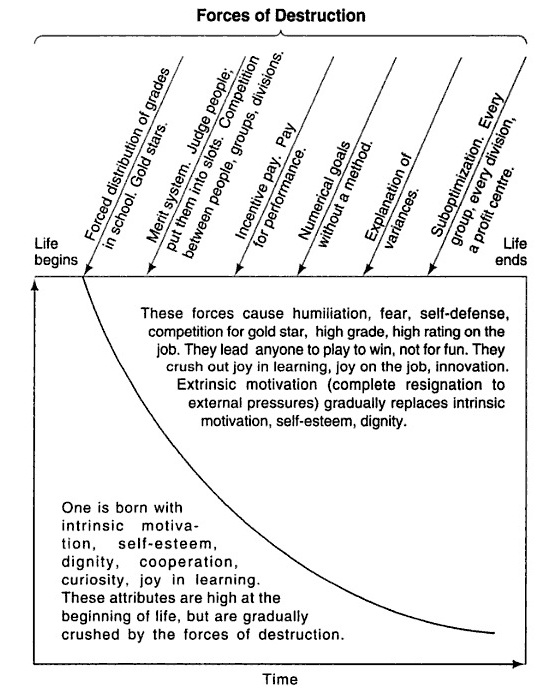A colleague recently made me aware of the Volkswagen brand campaign ‘The Fun Theory’ which illustrates how fun can be related to choices people make in life by presenting some light-hearted ideas to change mundane tasks such as throwing away litter or climbing stairs. For example against the question “Can we get more people to choose the stairs by making it fun to do?”, their electronic stairway piano made 66% more people choose the stairs over the escalator (http://www.youtube.com/watch?v=SByymar3bds&app=desktop).

Of course ideas around fun at work are not particularly new: Douglas McGregor talked about Theory Y managers assuming the people value work as an activity as natural as play. Deming – a statistician by trade, the godfather of Systems Thinking and Statistical Process Control and at first impression someone who would appear fairly austere by today’s standards, always opened his seminars with ‘we are here to have fun‘. Although in person he was actually someone with a strong sense of humour and a dry wit, more importantly, Deming always talked about the need (not the nice to have, the need – it was essential) for people to have “ joy in work“: it is one of his most distinctive and quotable catchphrases.
Let’s consider a couple of FUN: amusing, entertaining, or enjoyable [1]
definitions of fun and joy… JOY: a deep feeling or condition of happiness or contentment [2]
Clearly fun has roots in joy, whilst joy itself is a longer-lasting, life-permeating condition. Deming was clear about what should be done to bring joy back into work. Work should be designed such that it is a pleasurable experience, yet he recognised that most organisations design fun out of the experience. However fun (like respect) is not something that you ‘do’ to people – it is not the point of intervention. The trick is not to design fun back in as an add-on (like the piano steps), but instead to eliminate the things that take fun out of work – lack of purpose, lack of decision making, lack of information, inability to influence outcomes, inability to address the concerns of customers and users, inability to make the service improve, inappropriate comparisons of performance (celebration of irrelevant highs or castigation for lows which are outside our control), inbuilt sub-optimisation and inertia, judgement by uninformed outsiders or distant supervisors. Deming didn’t pull punches – these things were for him the forces of destruction.
Even people doing unimaginably difficult jobs in emergency services, terminal healthcare and humanitarian aid (to name a few), themselves gain deep satisfaction and joy in what they do. In these spheres, however, even people with a strong sense of vocation can be demotivated by the negative forces impinging on their work and can leave their professions. Fun and joy are central to the understanding of human psychology of work – and how we should design it.
To think otherwise is counterproductive. A lack of joy at work is a complete nonsense.
Further reading:
Bakke D.W. (2005) Joy at Work, PVG, Seattle.
Csikszentmihalyi, M. (1990) Flow: the psychology of optimal experience, Harper Perennial, NY.
Deming W.E. (1993) The New Economics, MIT CAES, Cambridge MA.
Kilian C.S. (1992) The World of W Edwards Deming. SPC Press TE.
[1] http://www.oxforddictionaries.com/definition/english/fun
[2] http://www.collinsdictionary.com/dictionary/english/joy



